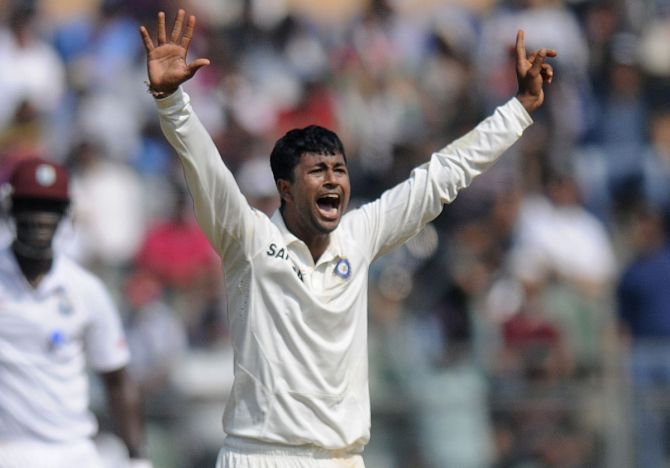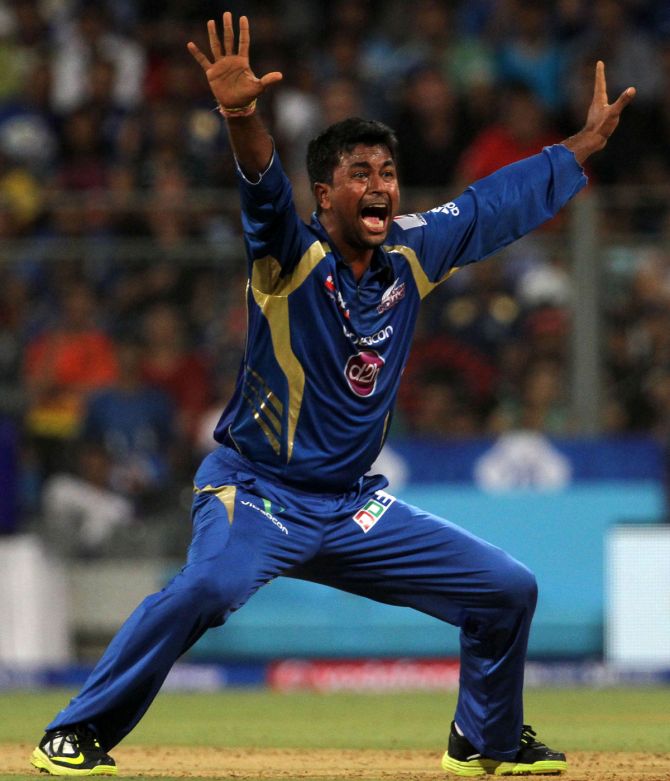'... And give him the confidence and freedom to express himself.'

Not many remember the man of the match in Sachin Tendulkar's farewell Test, against the West Indies in Mumbai in November 2013.
It was left-arm spinner Pragyan Ojha, who took five wickets in both innings, to bowl India to a huge victory by an innings and 126 runs.
It was also his final game for his country.
Ojha continued the fine lineage of Hyderabad spinners going on to play for the country, when he made his India debut in the 2008 Asia Cup in Bangladesh at 21.
He earned his India cap on the basis of good performances in the inaugural IPL in 2008 and also for India 'A'.
Ojha made a dream start to Test cricket when he became the third fastest Indian bowler to pick up 100 wickets in 2013. He achieved the landmark in just his 22nd Test, following in the footsteps of spin legends Erapalli Prasanna and Anil Kumble who got there in their 20th and 21st Test respectively.
In the inaugural IPL in 2008, he took 11 wickets in 13 games. In the next season, he bagged 18 wickets from 15 games at an economy rate of 6.50 to play a major role in Deccan Chargers's title triumph in 2009 before going to take 21 wickets in 2010 -- the best by any bowler in that IPL.
Ojha also played a key role in Mumbai Indians's maiden IPL triumph with 16 wickets in as many games in the 2013 season.
Just when he looked all set to take his career to the next level, he was dealt a rude shock when he was banned from bowling in 2014 after his action was found to be illegal.
That turned out a body blow for the 27 year old. He returned to the game, but failed to make the same impact with Ravichandran Ashwin and Ravindra Jadeja emerging on the scene.
Ojha toiled hard for nearly a decade for Hyderabad before switching to Bengal in 2015-2016 after his home team dropped to the Plate Group in the Ranji Trophy. He came back to Hyderabad after a couple of years and then made the surprise choice to play for Bihar in 2018-2019 as he aimed to groom young spinners in the state.
Ojha, who is currently a member of the IPL Governing Council as representative of the Indian Cricketers Association, played 48 international matches -- 24 Tests, 18 ODIs and six T20Is -- before he retired from all forms of cricket in 2020 aged just 33.
The first of Harish Kotian/Rediff.com's two-part interview with Pragyan Ojha:
Do you remember your maiden call up to the Indian team?
I was home just after the first IPL and was preparing for a family holiday. I got a call and was informed about my inclusion in the national side.
The IPL was an unknown commodity for cricketers at that stage. Tell us about your first season in the IPL.
Prior to the IPL, I had a little experience in the Syed Mushtaq Ali T20 tournament, which gave an idea how to approach this format.
Our then Deccan Chargers coach Robin Singh guided me a lot, especially with the angles I need to bowl. He pushed me with my fielding and training. That was the first time most cricketers got a feel of international cricket before playing for the country.
In 2009, you played a big role in helping Deccan Chargers win the IPL title with 18 wickets. How was the feeling of winning your first IPL title?
Being at the bottom of the table in the first edition of the tournament, having one of the best teams, really hurt us. The journey began with Adam Gilchrist taking over as captain. He handled the pressure well and never let any outside matters get into the team environment.
I remember we had limited practice clothes, Gilly (Gilchrist) told us how things will turn around once we start winning and that's what exactly happened when we won the championship.
The next year, you emerged as the highest wicket-taker in IPL 2010 with 21 wickets in 16 games for the Deccan Chargers. What was the secret of your success in T20 cricket because not many spinners were able to adjust to T20 cricket in the initial years?
I believe a bowler needs a captain who can understand him and give him the confidence and freedom to express himself. And the bowler should always remember in this format batsmen will take him on.
Once you address the fear of getting hit, positive things will happen.

You also played a big role in Mumbai's first IPL title in 2013 with 16 wickets at an economy rate of just over seven.
What did winning the first IPL title means for Mumbai Indians who have gone on to win five titles in eight years?
Mumbai Indians are always the favourites in IPL. They belong to a city which has a rich cricketing culture and have dominated the Ranji Trophy.
So our management and owners were really working hard to repeat the same run in the IPL. The similarities I felt about the Deccan Chargers and Mumbai Indians was the environment that was created for the players. That's what makes a lot of difference.
You were coached by Hyderabad spin legends Kanwaljit Singh and Venkatapathy Raju. What are the things you learnt from those two great bowlers and how did it shape up your career?
Domestic cricket is very important and why your foundation should be solid.
While Hyderabad have produced some of the best batsmen against spinners like Mohammad Azharuddin and V V S Laxman, they have also produced some excellent spinners -- Ghulam Ahmed, Narasimha Rao, Shivlal Yadav, Arshad Ayub, Kanwaljit Singh (who was unlucky to not play for India), Venkatapathy Raju, you.
What has been the secret behind Hyderabad producing so many good spinners till a few years ago?
The cricketing culture and strong local league cricket made it possible for Hyderabad.
I fondly remember when I was growing up we had the three-day league for young kids which very few states have.
The cricketing system in Hyderabad, which included the three-day league, was very good. The batsmen and bowlers got used to playing in the longer format because of the three day leagues, that is why we had so many players from Hyderabad going on to play for India.
But after you no good spinner has emerged from Hyderabad. The team's showing has not been great in domestic cricket in the past few years. What do you think has been the reason?
We need to look back at where the chain has broken. What has happened to the players from junior cricket when they were supposed to graduate to the senior team?
You played nearly 10 years for Hyderabad before switching to Bengal and also played few games for Bihar. Why did you switch teams?
Hyderabad has been home, but at times you need to take few tough decisions even though you don't want to, to give yourself a chance for a comeback in the national side. When I left Hyderabad we were in the Ranji Trophy Plate Group. I wanted to play in the Elite Group, so I had to shift to Bengal.
By the time I shifted to Bihar I had an idea that my (India) comeback was impossible. I thought I had the opportunity to share my experience with the young boys from Bihar who had not played first class cricket in last 18 years.
Part 2: 'No one in the world will take it easy against India'











